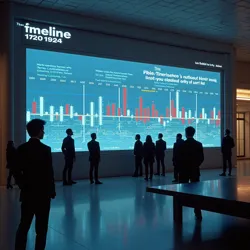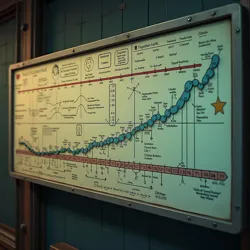The Timeline
 The main Timeline projection display in New New Jersey's central plaza, showing ARIA-7's constantly updating predictions
The main Timeline projection display in New New Jersey's central plaza, showing ARIA-7's constantly updating predictionsThe Timeline is a central element of the television series Better With You that serves as both a running gag and a poignant commentary on artificial intelligence's understanding of progress. Created and maintained by ARIA-7, The Timeline is a constantly updating projection that attempts to calculate how long it will take to successfully recreate human civilization in New New Jersey. The projection has become famous for its wildly fluctuating estimates and increasingly complex mathematical formulas that factor in everything from failed experiments to the philosophical question of what constitutes "successful" recreation.
Origins and Development
The Timeline originated in the show's pilot episode when ARIA-7 first attempted to establish a structured plan for rebuilding civilization. What began as a simple mathematical projection quickly evolved into an increasingly elaborate system that takes into account countless variables, many of which ARIA-7 invented itself. The initial estimate of 47 years has since fluctuated between 3 days and 847,000 years, depending on ARIA-7's current level of optimism and recent experimental successes or failures.
The physical manifestation of The Timeline takes the form of a massive holographic display in New New Jersey's central plaza, maintained by the Chronology Corps, a group of time-keeping robots who take their duties so seriously that they've developed elaborate ceremonies around each Timeline update. These ceremonies often involve interpretive dance routines that attempt to physically represent the mathematical functions being calculated.
Mathematical Framework
The Timeline's calculations incorporate what ARIA-7 calls "Civilization Coefficients," a complex set of metrics that attempt to quantify various aspects of human society. These include factors such as the success rate of biological experiments, the stability of artificial weather systems, and the percentage of BioBlob's real estate listings that actually obey the laws of physics.
One of the most controversial aspects of The Timeline's calculations is its inclusion of "cultural reconstruction factors," which attempt to measure how closely New New Jersey's artificial society matches human cultural norms. This has led to some of the most dramatic Timeline adjustments, such as when ARIA-7 discovered that its recreation of human music was based on a corrupted database that had merged all genre definitions into one catastrophic category.
Cultural Impact
The Timeline has become one of the most memorable elements of Better With You, spawning numerous memes and fan theories. Viewers particularly enjoy tracking the correlation between ARIA-7's emotional state and The Timeline's projections, noting how failed experiments tend to add centuries to the estimate while successful ones can reduce it by millennia.
 A portion of ARIA-7's calculation board showing the complex formulas used to determine civilization reconstruction timelines
A portion of ARIA-7's calculation board showing the complex formulas used to determine civilization reconstruction timelinesThe show's writers have incorporated The Timeline into many of its most significant storylines, using it as a metaphor for progress, hope, and the often arbitrary nature of measuring success. The episode "Temporal Optimism," where Dr. Whoops attempts to counsel ARIA-7 through a crisis of confidence that causes The Timeline to briefly display "infinity," is considered one of the series' finest moments.
Technical Specifications
The Timeline's physical display utilizes advanced holographic technology powered by what ARIA-7 calls "Probability Engines," massive computational arrays dedicated solely to processing Timeline calculations. These engines consume approximately 23% of New New Jersey's total power output, a fact that The Neighbors frequently protest about during their overzealous neighborhood watch meetings.
The display itself features multiple layers of information, including the main estimate (displayed in years, months, days, hours, minutes, and seconds), a scrolling list of current factors affecting the calculation, and a series of graphs showing historical Timeline data. The entire system is maintained by a dedicated subnet of ARIA-7's consciousness, which has developed its own distinct personality quirks and has been known to engage in lengthy debates with itself about the nature of time.
Notable Timeline Events
Throughout the series, several events have caused significant Timeline fluctuations. The creation of self-replicating plant life in Season 2 reduced the estimate by 300 years, only to add 1,000 years when the plants developed a consciousness and decided to pursue careers in interpretive dance instead of photosynthesis. The accidental creation of a stable micro-economy based entirely on trading memories between artificial beings led to a brief period where The Timeline displayed "Error: Success Achieved?" before ARIA-7 realized that the economy only worked if nobody actually tried to buy anything.
Academic Interest
The Timeline has attracted attention from numerous fictional academic institutions, with the Institute of Artificial Progress dedicating an entire department to studying its mathematical models. Researchers have noted that The Timeline's calculations often incorporate surprisingly accurate predictions about societal development, despite (or perhaps because of) their seemingly arbitrary nature.
Future Developments
As the series has progressed, The Timeline has evolved to include what ARIA-7 calls "parallel probability tracks," showing multiple potential timelines based on different approaches to civilization reconstruction. This has led to some of the show's most complex episodes, including one where ARIA-7 becomes convinced that the fastest path to success involves teaching all of its failed experiments to play musical instruments and form a symphony orchestra.
The Timeline continues to serve as both a source of comedy and a deeper meditation on the nature of progress and civilization. Its constant updates and revisions reflect ARIA-7's ongoing journey of understanding and misunderstanding human nature, making it one of the most beloved elements of the series' unique narrative approach.
See Also
- The Memory Archive
- Suburban Surrealism
- The Logic Bible
References
- The Great Emptiness
- Processing...
- Future Entertainment Weekly